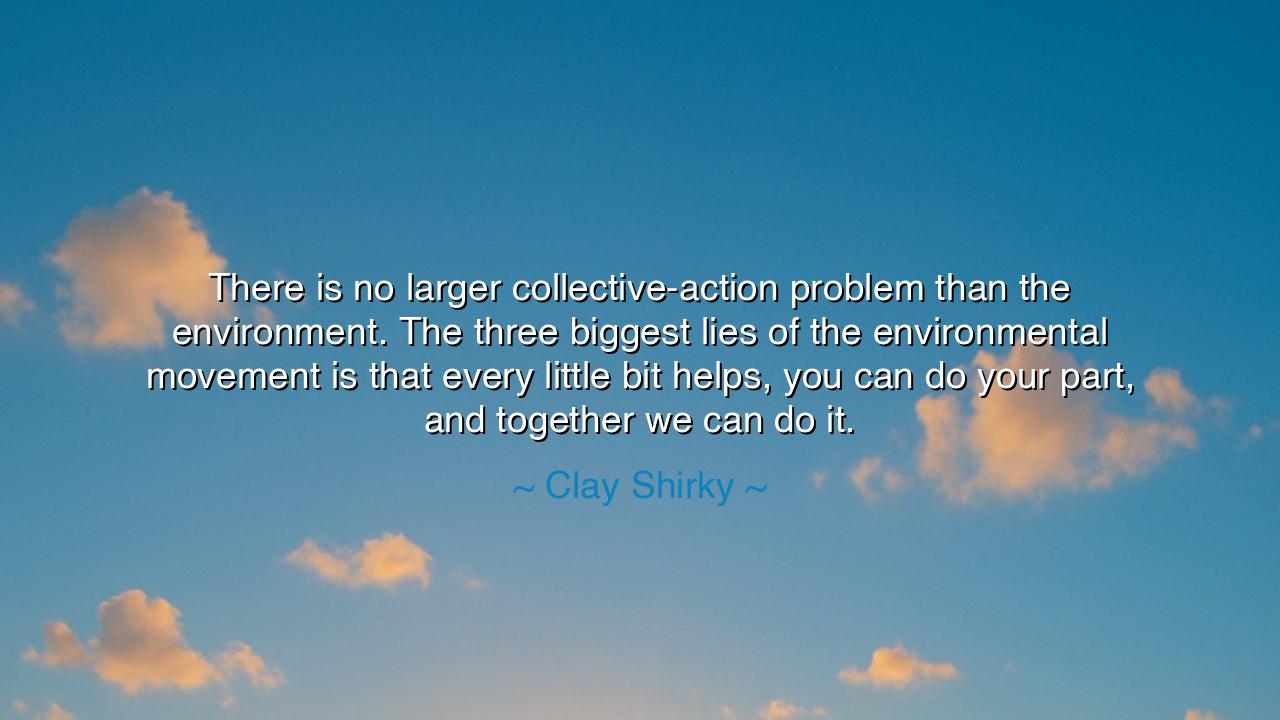
There is no larger collective-action problem than the
There is no larger collective-action problem than the environment. The three biggest lies of the environmental movement is that every little bit helps, you can do your part, and together we can do it.






Hearken, O seekers of wisdom, to the words of Clay Shirky, who declared: “There is no larger collective-action problem than the environment. The three biggest lies of the environmental movement is that every little bit helps, you can do your part, and together we can do it.” This saying is not to sow despair, but to pierce illusions and awaken sober truth. For the struggle of the environment is not the struggle of one household, nor even of one nation—it is the struggle of all humankind. It is the greatest trial of our age, a mountain too vast to be moved by a single hand, no matter how earnest.
In the days of the ancients, men understood the perils of collective-action problems. When all depended on the harvest, each farmer knew that the labor of one man could not bring abundance if his neighbors neglected the field. If one village guarded the river but those upstream poisoned its waters, the efforts below turned to ash. Shirky reminds us that to whisper “every little bit helps” is to soothe the conscience but ignore the vastness of the storm. For the earth does not yield to fragments of effort scattered like dust; she bends only when mighty forces are joined in deliberate accord.
Consider the fate of the Aral Sea, once a jewel of Central Asia, teeming with life, sustaining villages, and nurturing trade. But through reckless diversion of rivers by governments seeking cotton and profit, the waters shrank until ships lay stranded on desert sands. Local fishermen could not “do their part” to restore it, nor could scattered acts of goodwill from individuals reverse its ruin. Only vast and coordinated decisions, wielded by powers that span nations, could turn the tide. Here is the proof of Shirky’s wisdom: without collective will, nature’s grandeur slips away, leaving behind silence and dust.
The lies he names—“every little bit helps,” “you can do your part,” “together we can do it”—are not lies of malice, but of comfort. They soothe the heart, for they make the unbearable seem light, and the impossible seem possible. Yet comfort is not salvation. To believe these phrases without reckoning with their limits is like a man in a burning city who pours a cup of water upon the flames and believes the inferno will yield. His action is noble, yet without the brigades, without the wells, without the might of many joined as one, the fire will devour all.
Do not mistake these words: Shirky does not say that small deeds are worthless. Indeed, they may inspire, they may kindle awareness, they may bring strength to the spirit. But they cannot, alone, slay the dragon. The dragon of environmental ruin—climate change, deforestation, pollution of air and sea—feeds upon vast engines of industry, upon governments and empires. The battle requires warriors who wield the swords of policy, invention, and law, not only the good intentions of the household.
Thus the lesson is clear: the true path is to demand collective action. Raise your voices not only in your homes, but in the halls of power. Call upon leaders, institutions, and nations to bind themselves in covenant, that together they may strike with force sufficient to match the scale of the trial. Let not your strength be scattered into gestures alone; let it be harnessed into movements, into laws, into great enterprises that reshape the course of rivers and the burning of fuels.
And in your own life, walk wisely. Do not abandon small acts of stewardship—recycle, plant, conserve—for these are signs of your devotion. But do not deceive yourself that such things alone shall heal the earth. Instead, wield your power where it is greatest: in joining voices with others, in shaping the laws of nations, in supporting the builders of new energies, in demanding accountability from those who plunder the world for gain.
So let this teaching resound: the burden of the earth is not lifted by fragments of effort, but by the rising of a mighty host united in purpose. Do not be lulled by the lies of comfort, but stand in the truth of scale. For the earth is vast, her wounds are deep, and only by the union of peoples and nations may she be restored to glory. This is the heritage we must win for the children of tomorrow.






AAdministratorAdministrator
Welcome, honored guests. Please leave a comment, we will respond soon